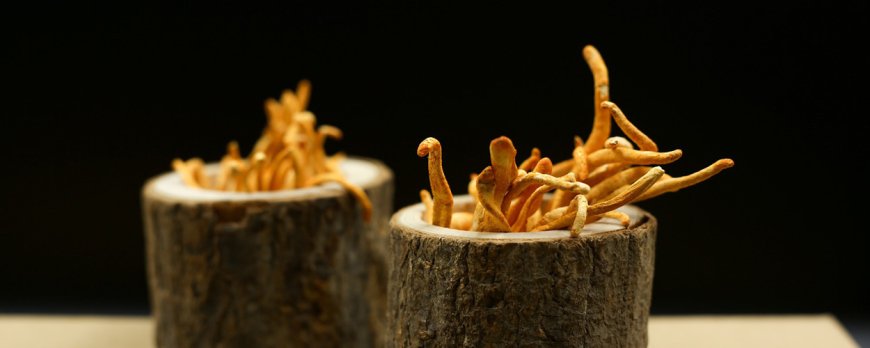Is cordyceps an effective traditional Chinese medicine?
Explore the role of Cordyceps in Chinese medicine. Is Cordyceps an effective traditional Chinese medicine? Dive into the benefits, uses, and science behind it.

Is cordyceps an effective traditional Chinese medicine?
Cordyceps, a traditional Chinese medicine, has long been used for its alleged health benefits, but does it live up to its reputation? This article explores the effectiveness of cordyceps as a traditional Chinese medicine and the need for scientific research to determine its true potential.
Key Takeaways:
- Cordyceps is a traditional Chinese medicine with historical usage for various ailments.
- Scientific research on cordyceps is limited and often of poor quality.
- Some studies suggest cordyceps may have positive effects on kidney function, heart health, and anti-aging.
- Cordyceps is known for its energy-enhancing properties.
- Further research is needed to fully understand the benefits and improve the quality of evidence.
The history and uses of cordyceps in traditional Chinese medicine
Cordyceps, also known as "winter worm, summer grass," has a rich history in traditional Chinese medicine, where it has been used for centuries to address a wide range of health conditions. This unique mushroom-like fungus grows on the larvae of insects, such as caterpillars, and has been highly valued for its medicinal properties.
In Chinese herbal medicine, cordyceps is believed to have various therapeutic uses. It is commonly used to strengthen the immune system, enhance respiratory function, and improve energy levels. Cordyceps is also utilized to support kidney health, improve cardiovascular function, and promote longevity.
Throughout history, Chinese medical practitioners have used cordyceps to treat ailments such as fatigue, respiratory disorders, and kidney diseases. It is often consumed as a tea, powder, or extract, and is sometimes combined with other herbs for synergistic effects. Cordyceps is highly regarded in Chinese herbal medicine for its ability to nourish the yin and yang energies of the body, promoting balance and overall well-being.
While traditional Chinese medicine has long embraced cordyceps for its potential health benefits, it is important to note that scientific research on its effectiveness is still limited. Despite the historical use and anecdotal evidence supporting its therapeutic properties, further high-quality studies are needed to fully understand and validate the claims surrounding cordyceps. As research continues to evolve, it is crucial to approach cordyceps and other traditional Chinese medicines with an open and evidence-based mindset.

The bioactive compounds in cordyceps
Scientific research on cordyceps has revealed the presence of bioactive compounds that may contribute to its potential health benefits. These compounds include cordycepin, adenosine, polysaccharides, and various amino acids. Cordycepin, in particular, has been studied for its anti-inflammatory and antioxidant properties, which may help protect against cellular damage and promote overall health.
Adenosine, another bioactive compound found in cordyceps, has been shown to have immune-modulating effects, potentially boosting the body's defense mechanisms and supporting immune function. Polysaccharides, on the other hand, are believed to have anti-tumor, anti-inflammatory, and anti-aging properties, offering potential benefits for various health conditions.
The potential health benefits of cordyceps
- Supports kidney function: Some research suggests that cordyceps may help improve kidney health by reducing inflammation and oxidative stress in the kidneys. However, more high-quality studies are needed to confirm these effects.
- Promotes heart health: Cordyceps has been investigated for its potential cardiovascular benefits, including its ability to regulate blood pressure, improve cholesterol levels, and enhance heart function. These effects may help reduce the risk of heart disease and improve overall heart health.
- Anti-aging properties: The antioxidant and immune-boosting properties of cordyceps may help combat the effects of aging. Some studies have suggested that cordyceps can enhance cellular function and improve longevity.
It is important to note that while promising, the existing research on cordyceps is limited in quality and scope. Further studies are needed to better understand the mechanisms of action and potential health benefits of cordyceps. Additionally, individual responses to cordyceps may vary, and it is always advisable to consult with a healthcare professional before starting any new supplement or treatment.
Cordyceps and Kidney Function
Some studies suggest that cordyceps may have positive effects on kidney function, but further research is needed to establish its efficacy. Cordyceps, a traditional Chinese medicine, has long been used in the treatment of kidney-related ailments. It is believed to possess bioactive compounds that can potentially improve kidney function and promote kidney health.
One of the key benefits attributed to cordyceps is its potential to enhance renal function. It has been found to support the overall health of the kidneys, potentially aiding in the management of conditions such as chronic kidney disease. Cordyceps has also been explored for its potential to protect against kidney damage caused by certain medications and toxins.
While limited research has shown promising results, it is important to note that the evidence base for cordyceps and kidney function is still relatively small and of varying quality. Thus, more rigorous studies are needed to fully understand the potential benefits of cordyceps for kidney health and to establish its efficacy in clinical applications.
In conclusion, preliminary studies suggest that cordyceps may have positive effects on kidney function. However, further well-designed research is necessary to provide more substantial evidence and to ascertain the true potential of cordyceps as a treatment for kidney-related conditions.

Cordyceps and Heart Health
Research suggests that cordyceps may have positive effects on heart health, but more high-quality studies are required to confirm these findings. Cordyceps, a traditional Chinese medicine with a long history of use, is believed to contain bioactive compounds that could support cardiovascular health. These compounds may help regulate blood pressure, reduce cholesterol levels, and improve blood flow, which are important factors in maintaining heart health.
One of the key bioactive compounds found in cordyceps is adenosine, which has been shown to have cardioprotective effects. Adenosine helps dilate blood vessels, allowing for better circulation and reducing the risk of heart disease. In addition, cordyceps contains antioxidants that can neutralize harmful free radicals in the body, reducing oxidative stress and inflammation, which are both associated with heart disease.
Furthermore, cordyceps has been found to improve exercise performance and endurance, making it an ideal supplement for athletes and individuals looking to support their cardiovascular system. By enhancing oxygen utilization and energy production, cordyceps may help improve heart function and overall cardiovascular performance.
How to Incorporate Cordyceps into your Routine
- Consider taking a high-quality cordyceps supplement that is certified and tested for purity and potency.
- Follow the recommended dosage instructions provided by the manufacturer or consult with a healthcare professional for personalized advice.
- Incorporate other heart-healthy lifestyle habits, such as regular exercise, a balanced diet, and stress management, to maximize the potential benefits of cordyceps.
- Monitor your heart health regularly with check-ups and medical tests to track any improvements or changes.
While cordyceps shows promise for heart health, it's important to note that it should not replace any prescribed medications or treatments. Always consult with a healthcare professional before adding any new supplements to your routine, especially if you have pre-existing medical conditions or are taking medications.
In conclusion, cordyceps has the potential to support heart health, but more high-quality research is needed to confirm its benefits. As with any supplement, it's important to approach cordyceps with caution and make informed decisions based on reliable information and expert guidance.

Cordyceps and Anti-Aging Properties
Some studies suggest that cordyceps may possess anti-aging properties, but more research is needed to establish its effectiveness in this regard. Cordyceps, a traditional Chinese medicine that has been used for centuries, is believed to contain bioactive compounds that have the potential to slow down aging processes and promote overall well-being.
One of the key ways in which cordyceps may exert its anti-aging effects is through its antioxidant properties. Oxidative stress, caused by an imbalance between free radicals and antioxidants in the body, is known to contribute to aging and various age-related diseases. Cordyceps contains antioxidants that help neutralize free radicals, reducing oxidative stress and potentially slowing down the aging process.
In addition to its antioxidant effects, cordyceps may also support anti-aging by boosting the immune system. As we age, our immune system tends to weaken, making us more susceptible to infections and diseases. Cordyceps has been shown to enhance immune function and stimulate the production of immune cells, helping to strengthen the body's defenses against age-related degeneration.
Benefits of Cordyceps for Anti-Aging:
- Potential antioxidant effects that reduce oxidative stress
- Support for immune system function, which tends to weaken with age
- Overall well-being and vitality
While these preliminary findings are promising, it is important to note that more high-quality research is needed to establish cordyceps' effectiveness in promoting anti-aging benefits. Future studies should focus on the specific mechanisms by which cordyceps exerts its effects and explore the optimal dosage and duration of treatment to maximize its anti-aging potential.
In conclusion, cordyceps may hold promise as a traditional Chinese medicine for promoting anti-aging effects. However, further research is required to provide more robust evidence and establish the optimal use of cordyceps for anti-aging purposes. As with any supplement or treatment, it is advisable to consult with a healthcare professional before incorporating cordyceps into your wellness routine.
Cordyceps as an Energy Enhancer
Cordyceps is renowned for its ability to boost energy levels, making it a sought-after supplement among athletes and those looking to enhance their physical performance. This traditional Chinese medicine has been used for centuries to improve stamina, endurance, and vitality.
One of the key reasons why cordyceps is believed to enhance energy levels is its effect on the body's oxygen utilization. Studies suggest that cordyceps may improve the efficiency of oxygen uptake by the cells, allowing for increased energy production. This can result in improved physical performance, making cordyceps a popular choice for athletes looking to push their limits.
Benefits of Cordyceps as an Energy Enhancer:
- Increased stamina and endurance
- Improved oxygen utilization
- Enhanced physical performance
- Reduced fatigue and post-exercise recovery time
In addition to its energy-enhancing properties, cordyceps is also believed to have antioxidant and anti-inflammatory effects, which can further support overall health and well-being. However, it is important to note that while cordyceps shows promise as an energy enhancer, more research is needed to fully understand its mechanisms of action and to determine the optimal dosage and duration of use.
Overall, cordyceps is a natural supplement that holds great potential for those seeking to boost their energy levels and improve their physical performance. Whether you're an athlete looking to take your training to the next level or simply want to enhance your overall vitality, cordyceps may be worth considering as a supplement.

The limitations of cordyceps research
While cordyceps shows promise, the current research on its effectiveness is limited by the low quality of evidence available. Although there have been scientific studies conducted on cordyceps, many of them have small sample sizes or lack rigorous methodology, making it difficult to draw definitive conclusions about its health benefits. The limited quantity and quality of research papers on cordyceps present challenges in determining its true potential as a traditional Chinese medicine.
Furthermore, the lack of standardized dosage and preparation methods for cordyceps makes it difficult to compare the results of different studies. With variations in cordyceps species, extraction methods, and chemical composition, it becomes challenging to establish consistent findings across various experiments. This lack of standardization makes it difficult to assess the true effectiveness of cordyceps in treating specific health conditions.
In addition, the majority of cordyceps research has focused on animal studies or in vitro experiments, which may not accurately reflect the effects of cordyceps in humans. While these studies provide useful insights, they cannot definitively prove the effectiveness of cordyceps in treating human health conditions. More high-quality clinical trials and studies involving human subjects are needed to strengthen the evidence base for cordyceps.
Key limitations of cordyceps research include:
- Limited quantity and quality of research papers
- Lack of standardized dosage and preparation methods
- Reliance on animal and in vitro studies
In conclusion, while cordyceps holds promise as a traditional Chinese medicine with potential health benefits, the current research is limited by the low quality of evidence available. Further studies with larger sample sizes, rigorous methodology, and standardized protocols are needed to establish the true effectiveness of cordyceps in treating specific health conditions.
The Future of Cordyceps Research
Further research is needed to fully unlock the potential benefits of cordyceps and improve the quality of evidence in traditional Chinese medicine. While cordyceps has shown promise in various areas, such as kidney function, heart health, anti-aging, and energy enhancement, the scientific research conducted thus far is limited and often of poor quality.
To better understand the effects of cordyceps on human health, rigorous studies with larger sample sizes and control groups are necessary. This will help establish a more solid scientific foundation for the use of cordyceps as a traditional Chinese medicine. Researchers should also aim to explore the mechanisms of action behind cordyceps' potential benefits, as well as investigate any potential side effects or interactions with other medications.
The Potential of Bioactive Compounds
One avenue of future research could focus on the various bioactive compounds found in cordyceps. These compounds, such as polysaccharides, nucleosides, and cordycepin, have been suggested to contribute to cordyceps' health benefits. Further investigation into their specific actions and potential therapeutic applications could provide valuable insights into the medicinal properties of cordyceps.
Additionally, more studies should be conducted to explore the optimal dosage, duration of treatment, and delivery methods for cordyceps. This will help healthcare professionals make informed recommendations to patients and ensure the safe and effective use of cordyceps as a traditional Chinese medicine.

The Importance of High-Quality Research
In order to establish cordyceps as a reliable and evidence-based treatment option, it is crucial to prioritize high-quality research. This includes conducting randomized controlled trials with proper blinding and placebo controls, as well as publishing results in reputable scientific journals. By adhering to rigorous scientific standards, the research community can build a strong body of evidence to support the use of cordyceps in traditional Chinese medicine.
In conclusion, while cordyceps shows promise as a traditional Chinese medicine, the future of cordyceps research lies in conducting well-designed studies that can provide robust evidence of its effectiveness and elucidate its mechanisms of action. By addressing the limitations of existing research and focusing on high-quality studies, we can gain a better understanding of the potential benefits of cordyceps and improve the quality of evidence in the field of traditional Chinese medicine.
Conclusion
Cordyceps, a traditional Chinese medicine, holds promise for a range of health benefits, but more rigorous scientific research is required to determine its true effectiveness. This ancient remedy has been used for centuries in the treatment of various ailments and is believed to contain bioactive compounds that offer numerous health advantages. However, the existing research on cordyceps is limited and often of poor quality, posing challenges in fully understanding its potential benefits.
Although some studies have indicated positive effects of cordyceps on kidney function, heart health, and anti-aging properties, the low quality of evidence prevents definitive conclusions from being drawn. While cordyceps has gained popularity among athletes and individuals seeking energy enhancement and an overall boost in stamina and vitality, more robust scientific investigations are needed to validate these claims.
Despite the current limitations, cordyceps offers a fascinating glimpse into the world of traditional Chinese medicine. Its historical uses and the potential health benefits associated with its consumption highlight the need for further research to improve the quality of evidence in this field. By conducting rigorous scientific studies, we can gain a deeper understanding of cordyceps and its true efficacy as a traditional Chinese medicine, paving the way for a more informed approach to health and wellness.


































































































































